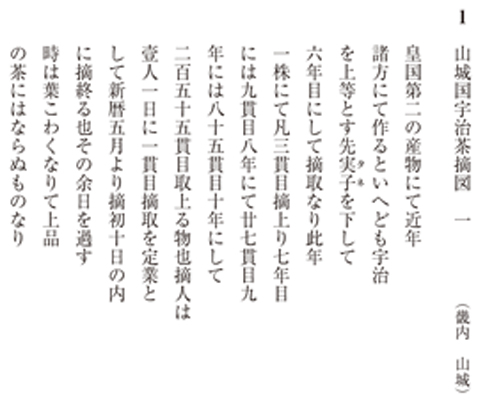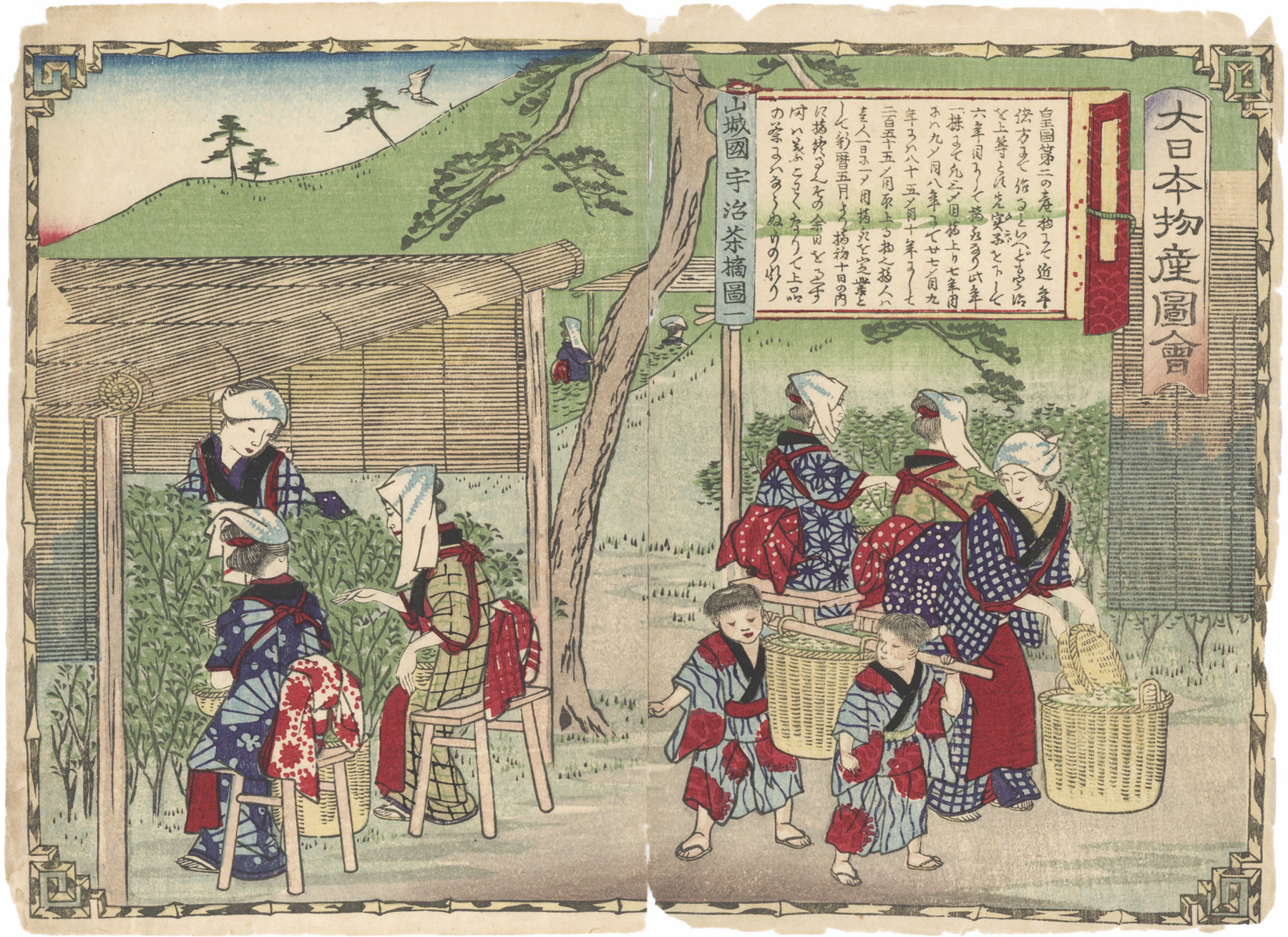About This Print
One of 118 prints in the series Dai Nippon Bussan Zue (Products of Greater Japan), issued in August 1877 to coincide with the opening of Japan’s first National Industrial Exposition (Naikoku Kangyō Hakurankai) held in Tokyo’s Ueno Park, depicting women and children picking tea in Uji, Yamashiro Province. The Uji district was famed for its tea plantations and its high-quality tea.In discussing tea harvesting and production in Uji, Johannes Justus Rein, Professor of Geography at the University of Bonn, writes in his 1899 book The Industries of Japan:
Historically, the "Uji powdered-tea industry was so important that it received bakufu protection, and farmers had to sell their tea through designated channels. Unlike farmers in other parts of the country, who cultivated tea on the footpaths between fields or on mountain slopes, Uji farmers grew their plants in groves. To produce a high-quality product, they latticed over their groves for superior grades of tea with straw or reed to protect the plants from the elements until the buds appeared."2
About thirty days before the first harvest, which begins in the middle of May (the second commencing at the close of the rainy season, about two months later), the tea-gardens of Uji are roofed over. The roof rests on stakes and poles, and is composed of mats made from reeds laid closely side by side. It stands from one and a half to two meters above the ground – the bushes are from half to one meter high – so that people at work can walk about under it comfortably, and attend to the first crop of leaves. When this over, the roof is taken down and put away in houses or sheds set apart for it, till the next year. It is said that it was in use more than two hundred years ago. Its object is to protect the bushes from the cold dew, which reddens the young leaves and gives them a bitter taste. It evidently diminishes the radiation of heat from ground and leaves, and thus the nocturnal cooling; the softened light, at the same time, lengthens the internodes of the young shoots and makes the leaves more tender.1
Also see IHL Cat. #1494 Producing Uji Tea in Yamashiro Province, figure 2.
Yamashiro Province (山城国 Yamashiro no kuni) was a province of Japan, located in Kinai. It overlaps the southern part of modern Kyoto Prefecture on Honshū. Aliases include Jōshū (城州), the rare Sanshū (山州), and Yōshū (雍州). It is classified as an upper province in the Engishiki. Yamashiro Province included Kyoto itself, as in 794 AD Yamashiro became the seat of the imperial court, and, during the Muromachi Period, was the seat of the Ashikaga Shogunate as well. The capital remained in Yamashiro until its de facto move to Tokyo in the 1870s.3

1 The Industries of Japan: Together with an Account of its Agriculture, Forestry, Arts and Commerce, J. J. Rein, A. C. Armstrong and Son, 1889, p. 116.
Multiple Editions (Variant Printings)
At least three variant printings (editions) were made of this series. Each variant printing uses a different colored cartouche containing the series' name, either red, green or rainbow-colored. [In addition, a blue cartouche occasionally appeared.] Different colored borders were also used and variances in the use of colors and shading are present in the three editions.
1 The Industries of Japan: Together with an Account of its Agriculture, Forestry, Arts and Commerce, J. J. Rein, A. C. Armstrong and Son, 1889, p. 116.
2 Japan's Protoindustrial Elite: The Economic Foundations of the Gōnō, Edward E Prat, Cambridge: Harvard Univ. Asia Center, 1999. p. 52 .
3 Wikipedia https://en.wikipedia.org/wiki/Yamashiro_Province
3 Wikipedia https://en.wikipedia.org/wiki/Yamashiro_Province
Print Details
| IHL Catalog | #1495 |
| Title or Description | Picking Uji Tea in Yamashiro Province, figure 1 山城国宇治茶摘図 一 Yamashiro no kuni Uji chatsumi zu ichi |
| Series | Dai Nippon Bussan Zue 大日本物産図会 (Products of Greater Japan) |
| Artist | Utagawa Hiroshige III (1842–1894) |
| Signature | 廣重筆 Hiroshige hitsu in bottom right margin (trimmed on this print) |
| Seal | none |
| Publication Date | 1877 (Meiji 10) |
| Publisher | Ōkura Magobei 大倉孫兵衛 (Kin'eido; 1843-1921) [Marks: pub. ref. 627] |
| Impression | good |
| Colors | excellent |
| Condition | fair - vertical centerfold reinforced by tape on verso; margins tattered on all sides with some paper loss |
| Genre | nishiki-e; kaika-e |
| Miscellaneous | |
| Format | chuban |
| H x W Paper | 6 3/4 x 9 1/8 in. (17.1 x 23.2 cm) |
| H x W Image | 6 3/8 x 9 in. (16.2 x 22.9 cm) |
| Literature | |
| Collections This Print | Waseda University Library Archives 01_04265_0001 |


